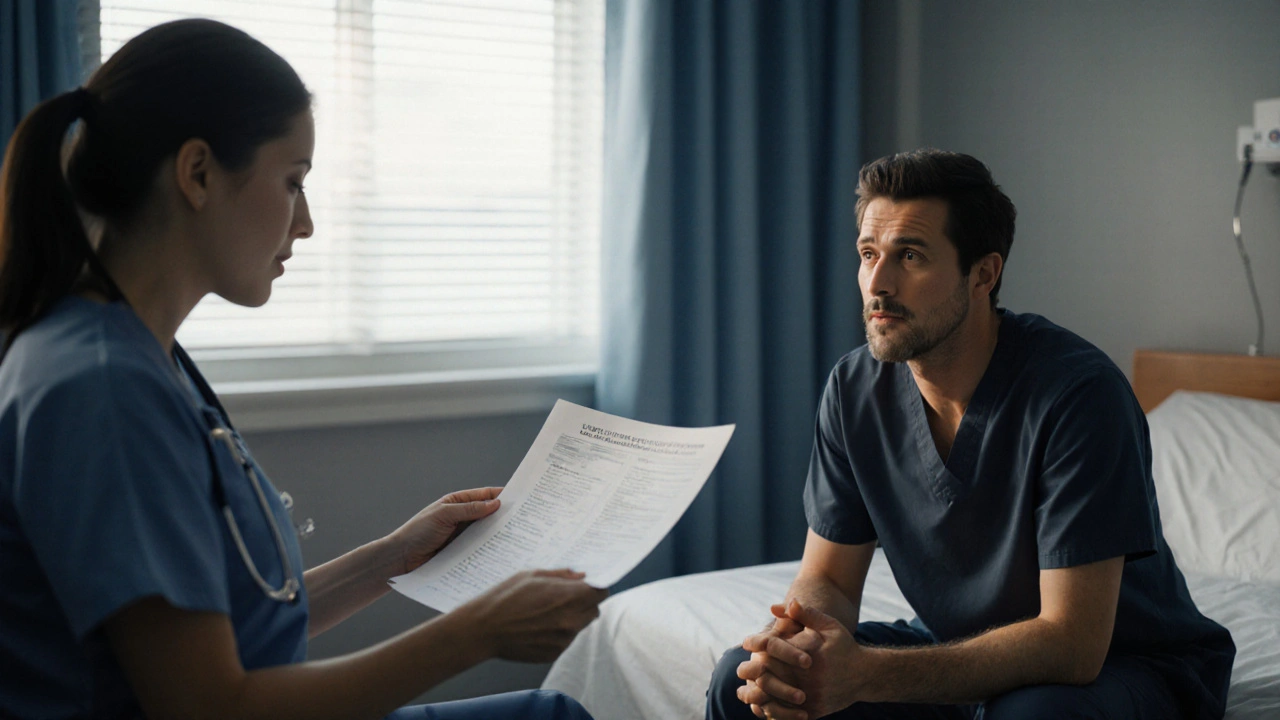Emotional Support Plan for Organ Rejection
Your Current Situation
Your Personalized Support Plan
Quick Summary
- Organ rejection triggers intense fear, grief, and uncertainty.
- Early emotional support reduces anxiety and improves treatment adherence.
- Professional help-therapy, counseling, and medication-can prevent depression.
- Peer groups and patient advocates provide practical coping tools.
- Creating a personalized support plan speeds emotional recovery.
When a transplanted organ shows signs of organ rejection, the medical crisis is only half the battle. The emotional roller‑coaster that follows can sap energy, cloud judgment, and even affect the effectiveness of new medications. This guide walks you through the psychological side of rejection, offering concrete steps to protect mental health while navigating the medical maze.
What Is Organ Rejection?
Organ Rejection is the immune system’s response that attacks a transplanted organ, recognizing it as foreign tissue. It can happen days, weeks, or even years after surgery and is classified into three types: hyperacute, acute, and chronic. The medical team monitors blood work, imaging, and biopsies to catch early warning signs.
Who Is Affected?
Transplant Recipient is any individual who has received a donated organ and now lives under a strict regimen of immunosuppressive drugs. Recipients often juggle hospital appointments, medication schedules, and lifestyle adjustments-all while fearing that their new organ might fail.
The Emotional Fallout
Rejection shakes the very foundation of hope built during the transplant journey. Common feelings include:
- Paralyzing fear of losing the organ.
- Grief for the time and effort already invested.
- Self‑blame over perceived non‑compliance.
- Isolation because friends and family struggle to understand the medical jargon.
These reactions are normal, but left unchecked they can evolve into clinical conditions like Anxiety is a persistent state of worry that interferes with daily functioning or Depression is a prolonged mood disorder marked by hopelessness, loss of interest, and fatigue. Studies from transplant centers in 2023 show that up to 40% of recipients report moderate‑to‑severe anxiety after a rejection episode.
Why Psychological Support Matters
Research consistently links mental well‑being to graft survival. A 2022 multicenter trial found that patients who received structured counseling had a 15% lower rate of acute rejection within the first year. The mechanism is two‑fold: reduced stress hormones improve immune regulation, and better mental health promotes adherence to Immunosuppressive Therapy is medications that dampen the immune response to prevent organ rejection.

Building a Support System
Strong networks act as a buffer against emotional overload. Below are the main pillars you can activate:
Peer Support Groups
Support Group is a regular gathering-often in‑person or virtual-where transplant recipients share experiences, tips, and encouragement. Hearing stories of others who survived rejection reduces feelings of isolation and provides practical coping ideas.
Professional Help
Mental Health Professional is a licensed therapist, psychologist, or psychiatrist trained to address emotional distress in medical contexts can offer evidence‑based interventions such as cognitive‑behavioral therapy (CBT), mindfulness‑based stress reduction, and medication management for anxiety or depression.
Patient Advocacy
Patient Advocate is an individual-often a nurse navigator or trained volunteer-who helps patients understand their treatment plan, schedule appointments, and communicate with the care team. Advocates ensure that emotional concerns are logged in the medical record, prompting clinicians to address them directly.
Choosing the Right Support Option
| Type | Access | Typical Cost | Key Benefits | Best For |
|---|---|---|---|---|
| Peer Support Group | Hospital‑run or online platforms | Free‑to‑low | Shared experience, practical tips | Those who feel alone |
| Mental Health Professional | Private practice or transplant center | Insurance covered or $100‑$200 per session | Targeted therapy, medication management | Moderate‑to‑severe anxiety or depression |
| Patient Advocate | Hospital assignment or nonprofit | Typically free | Navigation help, emotional check‑ins | Complex medication schedules |
| Online Forum | Social media groups, dedicated apps | Free | 24/7 access, anonymity | Tech‑savvy patients seeking quick answers |
Practical Coping Strategies
Beyond formal support, daily habits can keep stress at bay:
- Keep a symptom journal. Log any physical changes, medication side‑effects, and emotional spikes. Review it with your care team to spot patterns.
- Practice guided breathing. Five minutes of diaphragmatic breathing lowers cortisol, which can help your immune system stay balanced.
- Schedule “worry time.” Set a 15‑minute window each day to vent concerns, then deliberately shift focus afterward. This reduces rumination.
- Stay physically active. Light exercise-walking, gentle yoga-improves mood and supports cardiovascular health, both crucial for graft longevity.
- Connect with loved ones. Share updates honestly; openness prevents misunderstandings and builds empathy.
These techniques are simple, low‑cost, and can be combined with professional guidance for maximum effect.
Supporting Family and Caregivers
Family members experience secondary stress, often called “caregiver burnout.” Encourage them to:
- Attend at least one support group session to hear peers’ perspectives.
- Seek individual counseling if they notice signs of anxiety or depression.
- Take scheduled breaks-short walks, hobbies, or sleep-to recharge.
When caregivers feel supported, they’re better equipped to assist the recipient with medication adherence and appointment logistics.
Resources and Next Steps
Below is a quick checklist to launch your emotional recovery plan after a rejection episode:
- Notify your transplant coordinator about the rejection event.
- Schedule a meeting with a mental health professional within the next week.
- Join a local or virtual support group-most hospitals provide a list.
- Identify a patient advocate or nurse navigator to help with medication questions.
- Start a daily journal capturing physical symptoms and emotional reactions.
- Implement at least two of the practical coping strategies listed above.
Following these steps creates a safety net that catches both physical and emotional setbacks, increasing the odds of a successful graft long‑term.
Frequently Asked Questions
Can anxiety really affect my transplanted organ?
Yes. Chronic stress elevates cortisol, which can suppress the immune system and interfere with the effectiveness of immunosuppressive drugs. Managing anxiety improves both mental health and graft survival rates.
How soon should I see a therapist after a rejection episode?
Ideally within a week. Early intervention prevents the escalation of fear into clinical depression and helps you stay on track with medication and follow‑up appointments.
Are there specific therapies proven for transplant patients?
Cognitive‑behavioral therapy (CBT) and mindfulness‑based stress reduction (MBSR) have the strongest evidence. Both target negative thought patterns and promote relaxation, which can lower inflammatory markers.
What if I can’t afford a therapist?
Many transplant centers offer counseling at no charge, and some insurance plans cover mental‑health visits fully. Additionally, free peer‑support groups and online forums can provide immediate emotional relief.
How do I involve my family without overwhelming them?
Set clear, short updates-email or a weekly call-so they stay informed but not overloaded. Invite them to a support group session where they can learn coping tools alongside you.


 Medications
Medications
HAMZA JAAN
October 3, 2025 AT 18:24Wow, another organ rejection-what a nightmare! It feels like the universe is conspiring against you, and honestly, you should have been more careful with those meds. I can’t stand seeing people ignore the red flags until it’s too late. This whole situation just screams negligence, and you deserve some serious wake‑up call.
April Rios
October 8, 2025 AT 09:31The psychological impact of organ rejection is not merely a side effect, it is a central component of the recovery process.
When the immune system turns hostile, patients often experience a cascade of fear that can undermine compliance.
Research from transplant centers in 2022 and 2023 consistently shows that anxiety levels rise sharply after the first signs of rejection.
This heightened anxiety can trigger a sympathetic response that actually interferes with immunosuppressive medication efficacy.
Therefore, integrating mental health support is as vital as adjusting dosages.
Cognitive‑behavioral therapy, for instance, equips patients with tools to reframe catastrophic thoughts.
Mindfulness‑based stress reduction, on the other hand, modulates cortisol production, which has downstream effects on immune regulation.
Peer support groups serve a dual purpose: they normalize the emotional turbulence and provide practical tips about medication timing.
A patient who hears that another’s “rejection scare” resolved with a simple dosage tweak is less likely to panic.
Moreover, involving family members in counseling sessions prevents the isolation that often fuels depressive spirals.
It is crucial to document emotional checkpoints in the same electronic health record where lab results are stored.
By doing so, clinicians can see correlations between mood scores and biopsy findings, adjusting treatment proactively.
Tele‑health platforms have lowered the barrier to accessing psychologists, especially for patients who live far from transplant centers.
Insurance providers are increasingly recognizing the cost‑effectiveness of preventive mental health visits, covering them at parity with physical appointments.
Ultimately, a holistic support plan that weaves together medical oversight, psychological care, and community resources yields the best graft survival odds.
byron thierry
October 13, 2025 AT 00:37Thank you for sharing this comprehensive guide; the information is both thorough and thoughtfully organized. I appreciate the emphasis on integrating mental health into post‑rejection care, as it aligns with best practices in transplant medicine. The practical coping strategies listed are especially valuable for patients seeking actionable steps.
bob zika
October 17, 2025 AT 15:44Indeed, the article provides an excellent overview,; the structure is clear, concise, and well‑supported,; the inclusion of tables,; and step‑by‑step recommendations,; all contribute to its utility.
M Black
October 22, 2025 AT 06:51Love the vibe, keep it up! 😊
Joanne Myers
October 26, 2025 AT 20:57The guide effectively highlights the necessity of peer support without excessive flourish.
rahul s
October 31, 2025 AT 12:04Yo, this stuff is fire! If you’re gonna battle organ rejection, you need a solid squad and some hardcore mind‑games to keep the stress monsters at bay-don’t let the docs scare you into a panic.
Julie Sook-Man Chan
November 5, 2025 AT 03:11It’s reassuring to see such a balanced approach; I’ll definitely recommend this to friends navigating similar challenges.
Amanda Mooney
November 9, 2025 AT 18:17Great resource-simple, hopeful, and actionable.
Tommy Mains
November 14, 2025 AT 09:24Step one: talk to your transplant coordinator right away; step two: set up a counseling appointment within a week; step three: start a daily symptom journal.
Danielle Ryan
November 19, 2025 AT 00:31Honestly, the whole system hides how stress hormones sabotage grafts-big pharma doesn’t want you to know that anxiety meds are just a distraction from the real cause. They push pills, while the hidden agenda is to keep patients dependent and scared. It’s a nightmare of manipulation.
Robyn Chowdhury
November 23, 2025 AT 15:37Well, another guide about feelings… 😒 It’s decent but could use a deeper dive into why we even feel fear in the first place.
Deb Kovach
November 28, 2025 AT 06:44True, but even a brief overview gives patients a foothold; every bit helps! 🌟
Sarah Pearce
December 2, 2025 AT 21:51i think this is greaat, but kinda long... like, wow!
Daisy Aguirre
December 7, 2025 AT 12:57What a brilliant map for navigating the emotional maze-bright, bold, and brimming with hope!
Jimmy the Exploder
December 12, 2025 AT 04:04ok but too much fluff i guess
Robert Jackson
December 16, 2025 AT 19:11While the guide is comprehensive, it fails to address the critical lack of standardized protocols across transplant centers, a glaring omission that undermines its practical applicability.
Robert Hunter
December 21, 2025 AT 10:17Indeed, establishing uniform guidelines would streamline care and ensure every patient receives equal support regardless of location.
Shruti Agrawal
December 26, 2025 AT 01:24I appreciate the clear language and the emphasis on emotional well‑being; the recommendations are both realistic and compassionate.